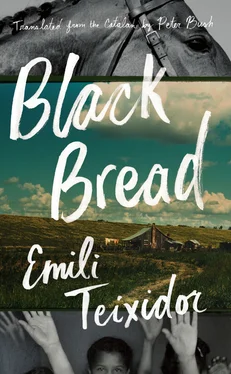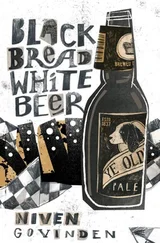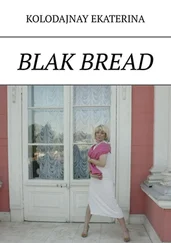Emili Teixidor - Black Bread
Здесь есть возможность читать онлайн «Emili Teixidor - Black Bread» весь текст электронной книги совершенно бесплатно (целиком полную версию без сокращений). В некоторых случаях можно слушать аудио, скачать через торрент в формате fb2 и присутствует краткое содержание. Год выпуска: 2016, Издательство: Biblioasis, Жанр: Современная проза, на английском языке. Описание произведения, (предисловие) а так же отзывы посетителей доступны на портале библиотеки ЛибКат.
- Название:Black Bread
- Автор:
- Издательство:Biblioasis
- Жанр:
- Год:2016
- ISBN:нет данных
- Рейтинг книги:3 / 5. Голосов: 1
-
Избранное:Добавить в избранное
- Отзывы:
-
Ваша оценка:
- 60
- 1
- 2
- 3
- 4
- 5
Black Bread: краткое содержание, описание и аннотация
Предлагаем к чтению аннотацию, описание, краткое содержание или предисловие (зависит от того, что написал сам автор книги «Black Bread»). Если вы не нашли необходимую информацию о книге — напишите в комментариях, мы постараемся отыскать её.
Born in 1933,
's first novel,
, was published to tremendous acclaim in 1988, followed by several more which established him as one of Spain's greatest contemporary authors.
Black Bread — читать онлайн бесплатно полную книгу (весь текст) целиком
Ниже представлен текст книги, разбитый по страницам. Система сохранения места последней прочитанной страницы, позволяет с удобством читать онлайн бесплатно книгу «Black Bread», без необходимости каждый раз заново искать на чём Вы остановились. Поставьте закладку, и сможете в любой момент перейти на страницу, на которой закончили чтение.
Интервал:
Закладка:
I immediately befriended a lad of my age in my year who came daily from a nearby village; he lived in a big farmhouse and initially was as reserved and silent as I was. The fact he was from a farm and the way his large, purple eyes bulged when he looked at anyone predisposed me to find him nice and friendly. He spoke sincerely, never spitefully, and described his father as an almighty god of thunder who forced his family to jump to his orders and allowed nobody to answer back. He forced him to study and prescribed the grades he must get. I realized that he lived in fear of his father and that was why he delayed going home as long as he could. Later on in the school year I invited him to the bungalow for a snack and so we could study together, but after two or three visits Mr. and Mrs. Manubens insinuated indirectly during supper, when often the three of us were round the table, that the boy had a long way to walk back to his house and perhaps his family wouldn’t appreciate him staying back with me so often, he seemed a nice enough boy though he was rather slow on the uptake and possibly not as intelligent as he ought to be, and I should be making lots of friends, not just one, and you could be sure there were lots of boys from good households who could help me later on, who knows, life takes many twists and turns, one knows only too well, they become contacts, friendships, relationships, connections, acquaintances, allies, helping hands, old boys’ networks…whatever, because you could never tell what might help in the future, and you never forget your childhood friends.
From my contact with Quim, his deference towards his father, and his life terrorized by the terrible shadow he threw over the farmhouse, I concluded I’d been very lucky with my own father, who was never angry with me, never forced me to do anything and always taught me to be completely free, even of clingy, emotional ties and viscous tears and laments. In this respect, his death was yet more proof of his generosity, of the way he opened up a road to freedom for me, without imposing the least obstacle or hindrance. I wondered how poor Quim would feel if he were ever freed from his father’s powerful grip. I now lived under the shadow of Mr. and Mrs. Manubens, but with every day that passed I understood ever more clearly that when I became tired of them, I would leave, as soon as I felt adult and strong enough to stand on my own two feet.
Quim’s life also affirmed the value of sacrifice, my father’s in the first place, now he’d been transformed into a likable, distant memory I could summon when it suited me. I carried an equally light burden of the faces of Cry-Baby and of Grandmother Mercè when she said, “I’m on my way out now, but you two are still young and have a long way to go,” a pleasant farewell that involved no recriminations or paralyzing promises, or the naked youth with TB in his silent struggle against death who had no idea of the energy he radiated, and besides that he carried in his baggage pain, sacrifice, illness and remoteness, all these acts preached and exalted by the church meant their figures were hooked even more powerfully into my memory, as if blood congealed their influence to us, enabling me to find them at will and seek refuge in the images they projected and to go my way convinced they would accompany us for ever more, that they formed part of us.
During those early days I summoned these idols to the solitude of my huge, austere room, and that made it easier for me to accept the change, the nostalgia, the new routines, and they always appeared against a backcloth of woods, a dark, enclosed wood, a deep, deep green, silent still wood that cloaked every mystery. A mystery needed a signal before it showed itself, and the woods masked the mystery that had to be unmasked.
We knew about these mysteries because of the traces they left, without those telltale signs only nothingness would exist, or so I thought. The woods, that in my imagination included the hazel tree spinney and the heartsease garden with the TB patients and their white sheets, was the shrine that hid and safeguarded the mystery of my entire future, everything that had to happen, everything that awaited me that I still found unfamiliar. The woods were a hideout and salvation that at once revealed and hid itself, that was simultaneously manifest and secret, within the same vision it displayed and camouflaged, enclosing and opening up paths…, like a promise it does and doesn’t exhibit, like a small chest whose contents are unknown but whose mere presence implies secrecy and heralds mystery. Like the crust on black bread, on the desolate altar of the poor, its reality alone pointed to the whole ritual of sacrifice and pain that it nourished.
Near the bungalow and small city, there were no woods like mine, the one I felt to be my own, the landscape was all hillocks, sandy soil, clumps of pine trees and brush, and broad, bright, gently undulating hills. My mind was full of ravines, dark, inaccessible valleys, deep, damp arbours, dangerous gorges, abysses and escarpments, precipices… woods that were wild and enticing, that contained everything, where anything might happen, where one could get hopelessly lost, endless, infinite woods leading to France, to the end of the world, to freedom…
Mr. and Mrs. Manubens acted kindly and on Sundays they didn’t wake me up to go to first mass, but mid-morning, to go to solemn mass, sometimes with Mr. Manubens, sometimes by myself. They didn’t tell rosary beads in the evening, but listened to the radio or put records on a small, hand-wound gramophone and they listened to their music in silent rapture, music I thought sounded like the litanies and dirges of the friars in their monastery; they often invited friends and the odd priest and chattered away, drank coffee and ate sweets, wafers and small pastries. They always summoned me to these conversations in the main sitting room and introduced me to their guests, who all shook my hand and gave me intrigued glances and I’d sit there for a few minutes, depending on what they were talking about, and soon after I’d stand up and say my goodbyes using the excuse that I had to study or do homework. An old pharmacist who took a shine to me early on always put his hand on my waist and sometimes even pinched my legs or shoulder, joking: “Here’s the heir!” or else: “So what’s the heir of the house got to say for himself?”
I found the old pharmacist amusing, he’d flatter me though at the same time I found him rather disturbing. Occasionally, for no apparent reason, perhaps presentiments that arose from somewhere deep inside me, he reminded me of the figure of Mr. Madern, the teacher, and then, when I thought about it, on my way back to my room, I had experienced a new kind of fascination and excitement.
I could hear echoes of the conversations half-muffled by the walls in the passage, which I ignored, but sometimes, though not very often, if a word or sentence intrigued me, I’d listen and tiptoe to the door to catch what they were saying. But I never understood much and only grasped that they flitted easily enough from one topic to another, one minute they talked about the missions the bishopric was organizing in local villages to convert the world of labour — they talked a lot about the world of labour, never about the world of the working class my father used to talk about — and the Catholic Centres that had to welcome and set aright this world that had gone off the rails, and then it was the struggle against the Maquis and the lack of understanding shown by putrefying democratic states, then the different branches of Catholic Action, or whether it was or wasn’t time for a change in the Town Hall and how they would balance their own candidates with the ones suggested by the Administration in Barcelona and the government in Madrid. The topics I found most amusing and accessible were the ones broached by Mrs. Manubens and her friends, who were fanatical about morality, that’s what they called it “morality,” as if it were an institution and above individuals, and they would argue about whether the bishop should ban once and for all couples dancing cheek to cheek, what they also described as modern dancing, that the authorities tolerated, or the way women dressed — here lay another subtle difference between women and ladies, women belonged to the common people and they and their friends were upper-class ladies — who couldn’t wear skirts above the knee or sleeves above the elbow, and low necklines were completely banned, distinctions I found all the more amusing because I could never have imagined anyone bothering their heads about such trivia.
Читать дальшеИнтервал:
Закладка:
Похожие книги на «Black Bread»
Представляем Вашему вниманию похожие книги на «Black Bread» списком для выбора. Мы отобрали схожую по названию и смыслу литературу в надежде предоставить читателям больше вариантов отыскать новые, интересные, ещё непрочитанные произведения.
Обсуждение, отзывы о книге «Black Bread» и просто собственные мнения читателей. Оставьте ваши комментарии, напишите, что Вы думаете о произведении, его смысле или главных героях. Укажите что конкретно понравилось, а что нет, и почему Вы так считаете.












